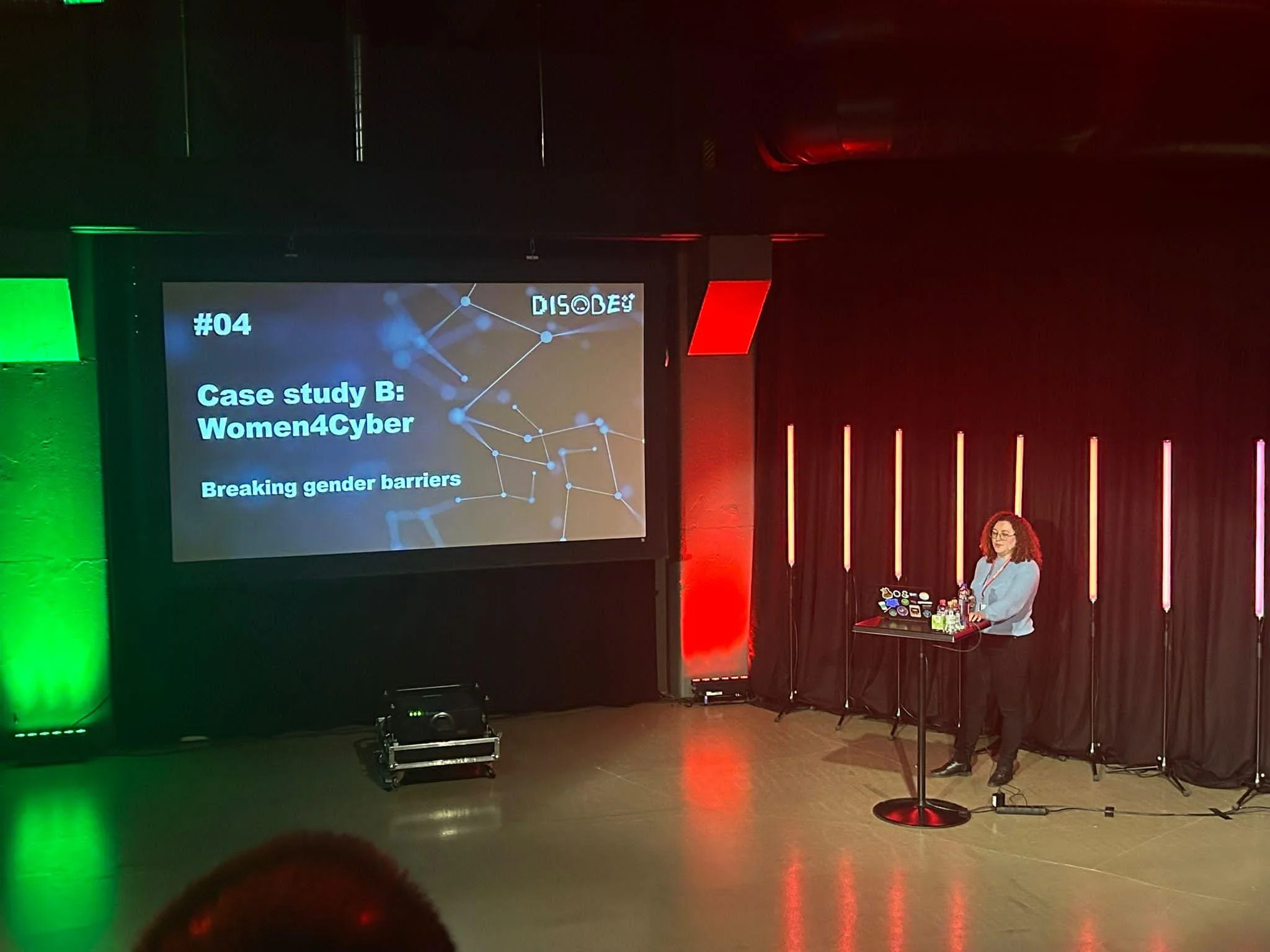You Don’t Code? Perfect. Cybersecurity Still Needs You.
Interview by: Judy Cohen
Picture of Bianca with her professional title
Bianca Buznean (Director, Head of Cyber Risk Management (Manufacturing industry) and Founder of Women4Cyber Denmark) gives insights on building belonging, breaking patterns, and what women bring to male-dominated fields.
Not every cybersecurity story starts with a keyboard. Some start with politics. Some start with being a Romanian girl in Greece trying to figure out how the world works.
“I don’t code.”
She says it in such an offhanded way... like you might say, “I don’t knit.” The only difference is, Bianca is one of Denmark’s leading cybersecurity experts. Her work in cyber lives in risk, policy, public-private collaboration, strategy. Not in Python.
“I don’t have a background in computer science.”
And yet... here she is. Over ten years into a successful cybersecurity career. She leads teams, manages crises, shapes systems, and founded the Danish chapter of Women4Cyber.
“The image of cybersecurity is not very clear. Still, people think of it as hoodie-wearing hackers in the dark... always on-call, no work-life balance, putting out fires.”
She laughs... but she’s not wrong.
“There are moments like that, sure. But it’s not the whole picture. Most of the field doesn’t look like that. I’ve never been called up at 3AM to fix something.”
No hoodie. No panic room. Just real systems, real problems, real people who need things to work. Often, those people don’t need a hacker...They need someone like Bianca.
“You need people who can translate between business and tech, legal and leadership. That’s what I do.”
So yes, cyber still needs coders…But it also needs communicators, negotiators, bridge-builders.
People who lead with context, not necessarily code.
From geopolitics to her first full-time job
Bianca came to Denmark for a master’s in Security and Risk Management at the University of Copenhagen.
“It was only the second year that the course was available.”
She chose it because it blended case-based learning with real-world issues. She wasn’t chasing a hot trend. She was chasing global impact.
“I was interested in the politics of cybersecurity... how cyber affects war and peace, state security, international relations.”
Not bad for a “non-technical” type. She took every cyber-related elective she could, and landed a student job at Danske Bank. They offered her a full-time role before her thesis was even done. She stayed... grew... pivoted. Not by hacking, but by navigating complexity.
Denmark felt different
Bianca was born in Romania, moved to Greece in primary school, studied in France, and then lived in Berlin. She’s lived abroad for most of her life. However, she says that Denmark felt different.
“I was very extroverted, very outgoing... and suddenly I didn’t know how to express myself here.”
It wasn’t rejection exactly, just a social structure that didn’t play by normal rules. Less small talk, more personal space.
You don’t integrate, you adapt
For Bianca, there was no dramatic “I belong!” moment. Just slow recalibration. After about four years… She stopped waiting to feel fully integrated. She started building her life the way she wanted it.
“I kind of blend in now... but I’m also aware that I probably won’t ever fully integrate..”
And it seems that by accepting that, Bianca has managed to find her own Denmark.
Make it stand out
Whatever it is, the way you tell your story online can make all the difference.
Why she built Women4Cyber and kept the door open…
Bianca founded the Danish chapter of Women4Cyber, not to create another tight club, but to open things up.
“We focus on advancing women in cyber. It’s open to everyone. It’s not just for women. We’re not exclusive. We don’t want to create a closed club. The idea is to make it more inclusive, not more exclusive.”
Because the problem isn’t just that there are too few women. It’s that too few women see themselves in the room.
“The cybersecurity community in Denmark is very small... and at events, it’s mostly a male audience. The more technical the topic... the fewer women you see.”
So her team started telling stories. Real ones.
“We’ve published stories of women who started in event management, accounting, marketing and then transitioned into cyber.”
She doesn’t talk about pipelines. She talks about people. No perfect résumés, just transferable skills and an open door.
“You can start anywhere... there’s always a transitional skill set you can use in cyber.”
Why don’t women often apply for Cyber related roles?
The next point Bianca brought up, hit hard.
“We had an event in Women4Cyber where we stripped down a job ad. We just listed the tasks, no title was provided. The younger women felt they could do it. The older ones held back.”
It wasn’t about capability. It was about permission.
“They could see the cyber hype... but they weren’t sure if they had the right background.”
The result? Women wait. Men apply. Even when women have exactly the skills the field needs.
“Stakeholder management, negotiation, influence... all of these are very needed, especially in cyber.”
Her advice? Apply. Even if it doesn’t feel like a perfect fit. Especially if it doesn’t. Women are needed.
You don’t have to be a stereotype to belong
Bianca knows she’s not a typical cyber story. And that’s exactly why she tells her story whenever she can. She’s here. Leading. Translating complexity. Mentoring. Speaking up. She belongs. And she’s not the only one.
“We’ve seen men who want to support the shift... some are mentors, some are team leads, some are senior experts. They want to see a different perspective.”
So yes, it’s still a male-dominated field. But the field is shifting. And Bianca? She’s the kind of woman who shifts it.
Should you get into the cyber field?
Bianca didn’t break into cyber. She walked in with strategy, vision, and beautiful curly hair.
She doesn’t code. She leads.
And she makes space for the next woman to walk through the door wearing loud jewelry, bold colors or a grey suit. Just bring the full you, the real you!
To women entering this space: your perspective is needed.
Not only because you’re a woman, but because diversity in thinking drives better outcomes in complex, uncertain environments.
For mid-career switchers: leverage your existing sStrengths.
Cyber and risk aren’t isolated domains; they touch every function. Bianca wishes someone had told her earlier that the skills of influence, storytelling, and collaboration are just as important as technical expertise.
For expats: building a network of trust and collaboration is critical.
Not just for career progression but for personal resilience. Denmark has a unique culture that values honesty, humility, and quiet competence, so adapt, but don’t dilute your distinct perspective.
Ultimately, Bianca wants to be remembered as a leader who helped others see the big picture, stay true to their values, and make bold yet thoughtful decisions.
For their careers, their teams, and the societies we shape together.
To connect with Bianca or find out more about Women4Cyber, please visit the links below:
https://www.linkedin.com/in/bianca-b-13097594/
Interested in more stories about women in Cyber?
https://women4cyber.dk/index.php/articles/
Further reading materials recommended by Bianca:
Diversity Matters: The future of work 2023 (McKinsey)
ISC2 Cybersecurity Workforce Study: Looking deeper into Culture and DEI (ISC2)
Women in Cybersecurity Report: Women in the Profession (ISC2)
DEI Doesn’t Disappear, It Becomes the Way We Work: Act Now to Prepare for the Future of Work (Gartner)
Position DEI as Risk Mitigation, Not Risk Creation (Gartner)
How DEI Can Persist in the Face of a Triple Squeeze (Gartner)
Business case for diversity in the workplace (World Economic Forum)
The Business Impact Of Diversity, Equity And Inclusion (Forbes)
The need for gender diversity in cybersecurity is real (IBM)
KPMG and the NCSC Decrypting Diversity 2021 report.pdf (NCSC)


